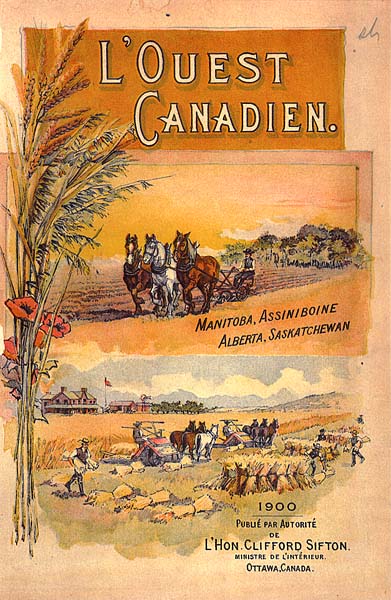Settlement of the West

Source: Link
Wilfrid LAURIER was the principal architect of what was to become one of his greatest projects as prime minister: the settlement of the Canadian west. To achieve this vision, as his biography states, he called primarily upon minister Clifford SIFTON:
“For Clifford
A mainstay of the effort to meet this challenge, Sifton put in place a strategy, as the following excerpt from his biography indicates:
“After moving to Ottawa [probably in 1896], Sifton appeared to abandon his western Liberal radicalism and to embrace the principles of John A. Macdonald’s policies of national development: protective tariffs, expansion of railways, and settlement of an agricultural population in the west. These policies would give Canada a measure of economic independence and diversify its economy, open new areas to settlement, provide access to untapped resources, and integrate the west into the dominion both as a consumer of domestic manufactures and as a producer of foodstuffs and other natural products in the international market.”
Although they shared a common and ambitious vision of the development of the Canadian west, Laurier and Sifton nevertheless had substantial differences of opinion, as revealed in Sifton’s biography:
“[Sifton’s] focus on material development and a strong central government and his belief in the fundamentally British Protestant character of Canada outside Quebec did not incline him to view generously the aspirations of minorities, particularly that of French Canada. In the end he and Laurier viewed the country from quite different perspectives that would prove difficult to reconcile.”
An episode from a decade earlier – the Manitoba school question – came back to haunt the prime minister in 1905, at the time when the provinces of Alberta and Saskatchewan were created:
“Playing a key role in the Liberal election victories of 1900 and 1904, successful in promoting the development of the west, and plainly carrying great weight in Laurier’s cabinet, Sifton astounded the country with his abrupt resignation at the end of February 1905. As he read the education clauses in the bills intended to establish the provinces of Alberta and Saskatchewan, he was convinced that they extended to the Roman Catholic minority privileges beyond those which they then possessed under the territorial government of Premier Frederick William Gordon
To learn more about the impact of the Canadian west on Laurier’s political career, we invite you to explore the following lists of biographies.





